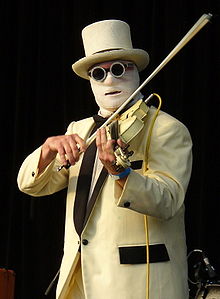I’ve always liked the music of Nash the Slash, but I didn’t know much about him — but that’s not uncommon when the artist performs his music while wrapped in bandages so you can’t see his face. Apparently he’s that rarest of creatures: a gay Canadian conservative:

The music industry has been dominated by left-leaning causes since the days of Woody Guthrie and Pete Seeger, not to mention the countless artists who’ve been influenced by Bob Dylan and Neil Young. In Canada, rock stars came out in droves for the funeral of NDP leader Jack Layton, but it’s hard to find one musician who would openly admit to supporting Stephen Harper. While country star Paul Brandt performed at the 2008 Conservative convention and Nova Scotia’s The Trews have a song called Highway of Heroes that’s been adopted by the Tories, neither would agree to an interview about their political views.
“I feel that conservatives are pragmatic and more fiscally responsible [than the Liberals],” says Nash the Slash, the late-’70s-era experimental Canadian artist who has recorded with Neil Young’s famed producer, Daniel Lanois. “I think the left is more carved into stone in some of their intractability and I may get flack for that, but I don’t care. You never see conservatives out there parading at the G20 summit — we tend to be less demonstrative.”
Politically, Nash the Slash’s career tells an interesting story, as he’s also an outspoken gay musician who lives in Leslieville (a Toronto neighbourhood often painted as left-leaning) and used to hoist the occasional beer with Layton. Still, the musician voted for the conservative-minded Rob Ford over gay liberal candidate George Smitherman in Toronto’s 2010 mayoral election, and isn’t afraid to flaunt his right-wing leanings.
“I voted for Rob Ford because I believe in fiscal responsibility and you can call him a bumbling fool, but guess what? We’re not going to have any money to support the gay Pride parade unless we get our books straight,” he says. “If we don’t conserve our money, eventually, we’re all going to turn into Greece.”
It’s not surprising that outspoken right-wing rockers such as Nash the Slash are hard to find, though. Even when conservative politicians reach out to the music world, they tend to find their hands slapped back.
Wikipedia entry for Nash the Slash.
Since 1979 Nash has always performed with surgical bandages covering his face. “During a gig at The Edge in the late ’70s to raise awareness of the threat from the Three Mile Island disaster, he walked on stage wearing bandages dipped in phosphorus paint and exclaimed: “look, this is what happens to you”. The bandages became his trademark.” Prior to 1979, Nash performed three times on TV Ontario’s Nightmusic Concert, first as a solo artist (a live broadcast which was never re-aired), then with FM (Nash and Cameron Hawkins), then again as a solo artist. In all of these appearances Nash wore his typical black tuxedo, top hat, and dark sunglasses, but wore no bandages.
Born Jeff Plewman (as given in copyright depositions at the Library of Congress), he has attempted to keep his true identity the subject of some speculation. In a 1981 interview with the UK magazine Smash Hits, Nash’s response to a question about his real name was “Nashville Thebodiah Slasher”. By never officially confirming or denying his name, some fans came to believe Nash to be an alter ego of Ben Mink, who replaced him as FM’s violinist in 1978. This is a common misconception but he has been photographed onstage with Ben Mink.



